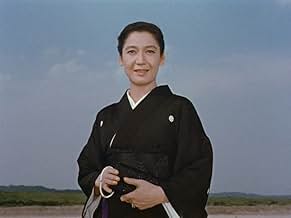This is classic Ozu, a small slice of life, a crucial turning point in the history of a family fighting the inevitable progress of time and change. In this case it is a family consisting of a widower, clearly someone with a racy past, and his four children - a somewhat dim son, two dutiful older daughters, and a sharp tongued younger daughter, outraged that her father is determined to age disgracefully. He (played by the impish Ganjiro Nakamura) is sneaking off from his duties at his struggling sake brewery to meet an old flame. His eldest daughter, in true later Ozu style is reluctant to accept the hand of an apparently decent suitor. His second daughter is torn between the 'good' match and her true love, an impoverished academic.
Ozu's penultimate film, and perhaps this is reading too much into it, but its hard not to see his vision of his own impending death in it, despite the great humour in it.
This is a meditation on a dying world - despite the vibrant photography, the film resonates with images of passing - constant visions of graveyards, an old dying Japan, the families roots in a dying form of business as they are overtaken by big, highly capitalised larger companies. The ending is sad and inevitable, but not tragic - life does go on, and a new generation wills step in, even if the old traditions are not maintained.
One striking thing about this film is the incredible photography. Have humble domestic interiors every looked so stunningly beautiful? The lighting is luminous, every scene is as perfectly composed as a Vermeer painting.



































